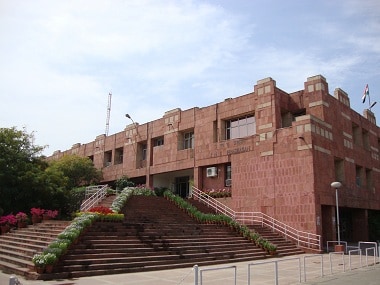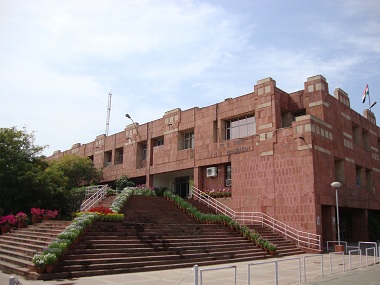The Delhi High Court on Monday rejected the plea of Jawaharlal Nehru University (JNU) student Najeeb Ahmed’s mother seeking constitution of a special investigation team instead of the Central Bureau of Investigation (CBI) to probe the case of her missing son. A bench of Justices S Muralidhar and Vinod Goel also directed the CBI to file a closure report in the case, thus slamming the lid shut on Ahmed’s disappearance from the university.[caption id=“attachment_5192221” align=“alignleft” width=“380”]  File image of the JNU campus. Image courtesy jnu.ac.in[/caption] The cases of Ahmed and Kanhaiya Kumar now stand in stark contrast: the disappearance of the MSc Biotechnology student slipped down a memory hole, but the former JNUSU president’s arrest grabbed nationwide attention and hurtled him into prominence. A Kafkaesque entropy has played out in the two years since Ahmed’s unexplained disappearance. Ahmed became the subject of slogans and posters only to re-disappear into a dead end. Ahmed went missing On 14 October 2016, following an alleged scuffle with some other students. As expected, it took no time for his disappearance to assume political overtones on the highly politicised JNU campus. The most convenient narrative that started shaping up was that some ‘right-wing’ students were behind Ahmed’s disappearance. Subsequently, a spree of allegations and counter-allegations were made by the Left and the Right against each other on the campus. Ahmed’s disappearance, which should have been seen essentially from the ambit of ‘crime’, was analysed through a political prism. Protests were staged against the alleged ‘hostility’ towards him by ‘right-wing goons’. However, unlike the protests that followed Kumar’s arrest in February the same year, these demonstrations failed to gain momentum. The reason for the protests fizzling out was “different versions” of ‘truth’. In an interaction with Firstpost after Najeeb’s disappearance in 2016, Kumar said that “the current student union has not been able to forge unity” in Ahmed’s case. “This time around, there are many versions of the issue. My arrest was seen as a crackdown and an attack on the university, and that united the students.” Ahmed’s disappearance was also trivialised by the JNU administration, which treated it as a case of bullying where the bullied ‘child’ refused to come back to school fearing more bullying. A press release issued by the JNU administration on 8 December was conclusive in its judgment about the incident. In an attempt to put the record straight, the JNU administration seemed to have shunned logic. “The office of the chief proctor has submitted its proctorial enquiry report on the incident of Mahi‐Mandovi Hostel. The report has identified the students involved in the reported scuffle and has recommended their immediate transfer from their present hostel. It has also recommended that a strong warning should be issued to these students against repeating such scuffle in future,” it said. The university administration added, “The vice‐chancellor has approved the report and suggested that after Najeeb Ahmed is found, the disciplinary action awarded by the warden’s committee for vacating hostel premises by Mr. Ahmed may be revisited. The JNU administration appeals to Mr. Najeeb Ahmed, MSc. student of biotechnology, to return to university and resume academic pursuits without apprehensions.” In plain term, the JNU administration stated that those allegedly involved in the scuffle have been identified—and like intimidating bullies we all face in schools, they were punished by changing their seats (read hostel). Besides, the JNU administration through its appeal to Ahmed to return to the campus seemingly decided and made it clear that he had gone missing on his own and steered clear of any foul play. Politics is substantially underlined by rhetorical arguments and there can be different versions of truth but law relies on fact. In Ahmed’s case, politics simply outdid law. The case, which should have been treated as a criminal act and investigated accordingly, was messed up by the unavoidable politics of the campus—and his disappearance was completely ignored amid the politics. On 28 November, 2016, the Delhi High Court, while listening to the plea on Ahmed’s disappearance, asked the Delhi Police to “cut across all political barriers” to find him and said that there could be “something more” to his disappearance as no one can just vanish from the heart of the national capital. “This is the heart of India, the national capital. No one can just disappear from here. It creates a sense of insecurity in people. If he disappeared, then there is something more to that. All angles have to be explored. Forty-five days is a long period for someone to be underground,” the court said.
Najeeb Ahmed went missing On 14 October 2016, following an alleged scuffle with some other students. As expected, it took no time for his disappearance to assume political overtones on the highly politicised JNU campus.
Advertisement
End of Article


)

)
)
)
)
)
)
)
)



